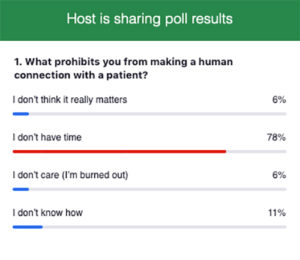Time. That is the No. 1 reason physicians report not always making a human connection with patients—and 56% of them reported that they don’t even have the time it takes to show compassion, according to Jake Poore, President and Chief Experience Officer of Integrated Loyalty Systems Inc. in Orlando.
 Poore, who spent 18 years of his career at Walt Disney World, led a workshop during Friday’s “MasterClass: Resilience and Teamwork,” where he emphasized the importance of compassion in medicine, not only for the good of patients, but for the good of physicians as well.
Poore, who spent 18 years of his career at Walt Disney World, led a workshop during Friday’s “MasterClass: Resilience and Teamwork,” where he emphasized the importance of compassion in medicine, not only for the good of patients, but for the good of physicians as well.
“Compassion doesn’t lead to burnout,” he said. “In fact, it may be the antidote.”
Physician burnout is at epidemic levels with 42% of doctors reporting feeling burnt out, even before COVID, Poore said. The physicians who reported being most dissatisfied with the quality of their relationship with patients were 22 times more likely to burnout.
Conversely:
- Medical students who received compassion training had a rise in compassion and drop in depression symptoms.
- Physicians with higher empathy and ability to take their patients’ perspective were 69% less likely to show signs of burnout.
- Nurses with increased activity in compassion centers of the brain predicted lower burnout.
- 91% of CMOs felt that showing compassion for others reduced their stress levels and risk of burnout.
There is clearly a correlation, Poore said. It’s a common misconception that highly compassionate providers are more at risk for burnout, but the inverse is actually true.
“It takes only 40 seconds to make a connection,” he said. “It’s not rocket science, but it is hard work.”
He indicated that doctors can increase their connection ratio by following three steps at each appointment or interaction:
- Enter on the human (greet patients, make eye contact, use positive body language)
- Conduct your business
- Exit on the human (ask if they have questions—without your hand on the doorknob)
“Don’t skip any of the ‘humans,’ because that erodes trust,” Poore said.
Patients are not the only ones who crave a relationship with their doctors; the medical staff does, too, he said. A toxic culture at work is not only bad for patients, it’s bad for business.
“I know your list is long, and I know it’s hard to be optimistic with all these pebbles in your shoes and amidst a pandemic, but we have to be more intentional and clear about what we stand for and what we’re not going to stand for anymore,” Poore said.
Friday’s MasterClass also featured a presentation on “Agility and Resiliency” by Amer Kaissi, PhD, who is a certified professional executive and physician coach.
Return to Index